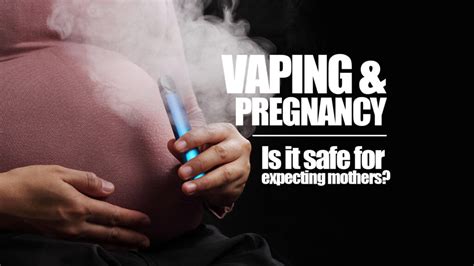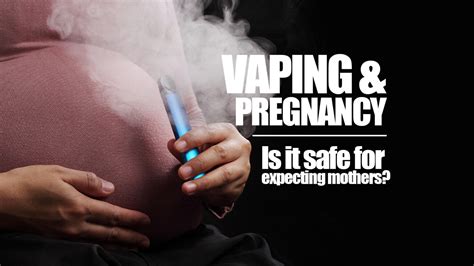Intro
The use of electronic cigarettes, commonly known as vaping, has become increasingly popular over the past decade. While some individuals view vaping as a safer alternative to traditional tobacco products, the risks associated with vaping, particularly during pregnancy, are not entirely understood. As the vaping industry continues to grow, it is essential to examine the potential effects of vaping on pregnant women and their unborn babies. The importance of this topic cannot be overstated, as the health and well-being of both mother and child are at stake.
Pregnancy is a critical period in a woman's life, and any substance use during this time can have significant consequences. The use of tobacco products, including cigarettes and chewing tobacco, has long been linked to various pregnancy complications, such as low birth weight, premature birth, and miscarriage. While vaping may be perceived as a safer alternative, the lack of regulation and research on the topic has raised concerns among healthcare professionals. As the vaping industry continues to evolve, it is crucial to investigate the potential risks associated with vaping during pregnancy and to educate expectant mothers about the potential dangers.
The vaping industry has experienced rapid growth in recent years, with a wide range of products available on the market. These products often contain nicotine, flavorings, and other chemicals, which can be harmful to pregnant women and their unborn babies. Nicotine, in particular, is a highly addictive substance that can affect fetal development and increase the risk of pregnancy complications. Furthermore, the flavorings and other chemicals used in vaping products can be toxic and cause a range of health problems. As the use of vaping products continues to rise, it is essential to examine the potential effects of these substances on pregnant women and their unborn babies.
Vaping and Pregnancy: Understanding the Risks

Vaping during pregnancy can have significant consequences for both the mother and the unborn baby. Nicotine, a highly addictive substance found in many vaping products, can affect fetal development and increase the risk of pregnancy complications. Research has shown that nicotine can reduce blood flow to the placenta, which can deprive the fetus of essential oxygen and nutrients. This can lead to low birth weight, premature birth, and other complications. Furthermore, nicotine can also affect fetal brain development, which can lead to cognitive and behavioral problems later in life.
In addition to nicotine, vaping products often contain flavorings and other chemicals that can be toxic to pregnant women and their unborn babies. These chemicals can cause a range of health problems, including respiratory issues, cardiovascular disease, and cancer. The long-term effects of these chemicals on fetal development and child health are not yet fully understood, but research suggests that they can have significant consequences. As the vaping industry continues to grow, it is essential to investigate the potential risks associated with vaping during pregnancy and to educate expectant mothers about the potential dangers.
Benefits of Quitting Vaping During Pregnancy
Quitting vaping during pregnancy can have numerous benefits for both the mother and the unborn baby. By quitting vaping, pregnant women can reduce their risk of pregnancy complications, such as low birth weight and premature birth. Quitting vaping can also improve fetal development, as nicotine and other chemicals are no longer present in the mother's bloodstream. Furthermore, quitting vaping can reduce the risk of respiratory problems, cardiovascular disease, and other health issues associated with vaping.Quitting vaping during pregnancy can be challenging, but there are numerous resources available to support expectant mothers. Healthcare professionals can provide guidance and support, while counseling and support groups can help women stay motivated and on track. Nicotine replacement therapy and other medications can also be used to manage withdrawal symptoms and cravings. By quitting vaping during pregnancy, women can give their unborn babies the best possible start in life and reduce their risk of pregnancy complications.
The Effects of Vaping on Fetal Development

Vaping during pregnancy can have significant effects on fetal development. Nicotine, a highly addictive substance found in many vaping products, can affect fetal brain development and increase the risk of cognitive and behavioral problems later in life. Research has shown that nicotine can alter the structure and function of the fetal brain, which can lead to attention deficit hyperactivity disorder (ADHD), anxiety, and depression.
In addition to nicotine, vaping products often contain flavorings and other chemicals that can be toxic to pregnant women and their unborn babies. These chemicals can cause a range of health problems, including respiratory issues, cardiovascular disease, and cancer. The long-term effects of these chemicals on fetal development and child health are not yet fully understood, but research suggests that they can have significant consequences. As the vaping industry continues to grow, it is essential to investigate the potential risks associated with vaping during pregnancy and to educate expectant mothers about the potential dangers.
Managing Withdrawal Symptoms and Cravings
Managing withdrawal symptoms and cravings is crucial for pregnant women who are trying to quit vaping. Nicotine replacement therapy and other medications can be used to manage withdrawal symptoms, such as irritability, anxiety, and insomnia. Counseling and support groups can also provide guidance and support, while healthy habits, such as exercise and meditation, can help women stay motivated and on track.It is essential to note that quitting vaping during pregnancy can be challenging, but it is not impossible. With the right support and resources, pregnant women can overcome their addiction and give their unborn babies the best possible start in life. Healthcare professionals can provide guidance and support, while counseling and support groups can help women stay motivated and on track. By managing withdrawal symptoms and cravings, pregnant women can reduce their risk of pregnancy complications and improve fetal development.
Vaping and Breastfeeding: What You Need to Know

Vaping during breastfeeding can have significant consequences for both the mother and the baby. Nicotine, a highly addictive substance found in many vaping products, can pass into breast milk and affect infant development. Research has shown that nicotine can reduce milk production and alter the composition of breast milk, which can affect infant nutrition and development.
In addition to nicotine, vaping products often contain flavorings and other chemicals that can be toxic to breastfeeding women and their babies. These chemicals can cause a range of health problems, including respiratory issues, cardiovascular disease, and cancer. The long-term effects of these chemicals on infant development and child health are not yet fully understood, but research suggests that they can have significant consequences. As the vaping industry continues to grow, it is essential to investigate the potential risks associated with vaping during breastfeeding and to educate breastfeeding women about the potential dangers.
Alternatives to Vaping During Pregnancy and Breastfeeding
There are numerous alternatives to vaping during pregnancy and breastfeeding. Nicotine replacement therapy and other medications can be used to manage withdrawal symptoms and cravings. Counseling and support groups can provide guidance and support, while healthy habits, such as exercise and meditation, can help women stay motivated and on track.In addition to these alternatives, pregnant and breastfeeding women can also try other strategies to manage stress and cravings. Deep breathing exercises, yoga, and other relaxation techniques can help women manage stress and reduce their cravings for nicotine. Furthermore, women can also try to avoid triggers, such as certain people or places, that may cause them to crave nicotine. By trying these alternatives, pregnant and breastfeeding women can reduce their risk of pregnancy complications and improve infant development.
Conclusion and Next Steps

In conclusion, vaping during pregnancy can have significant consequences for both the mother and the unborn baby. Nicotine, a highly addictive substance found in many vaping products, can affect fetal development and increase the risk of pregnancy complications. Furthermore, vaping products often contain flavorings and other chemicals that can be toxic to pregnant women and their unborn babies. As the vaping industry continues to grow, it is essential to investigate the potential risks associated with vaping during pregnancy and to educate expectant mothers about the potential dangers.
To take the next steps, pregnant women who are trying to quit vaping should consult with their healthcare professionals. They can provide guidance and support, while counseling and support groups can help women stay motivated and on track. Nicotine replacement therapy and other medications can be used to manage withdrawal symptoms and cravings, while healthy habits, such as exercise and meditation, can help women stay motivated and on track. By taking these steps, pregnant women can reduce their risk of pregnancy complications and improve fetal development.
Is it safe to vape during pregnancy?
+No, it is not safe to vape during pregnancy. Vaping can expose the fetus to nicotine and other chemicals that can harm its development and increase the risk of pregnancy complications.
Can vaping during pregnancy cause birth defects?
+Yes, vaping during pregnancy can increase the risk of birth defects. Nicotine and other chemicals in vaping products can affect fetal development and increase the risk of pregnancy complications.
How can I quit vaping during pregnancy?
+Quitting vaping during pregnancy can be challenging, but it is not impossible. Consult with your healthcare professional, use nicotine replacement therapy and other medications, and try healthy habits, such as exercise and meditation, to manage withdrawal symptoms and cravings.
If you have any questions or concerns about vaping during pregnancy, please do not hesitate to comment below. Share this article with your friends and family to spread awareness about the risks of vaping during pregnancy. Together, we can work towards a healthier and safer community for everyone.
